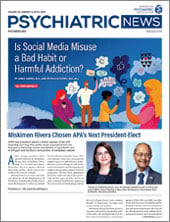The human mind faces an unprecedented revolution in the digital age, transforming how we connect and access mental health care. Commercial telepsychiatry and mental health apps offer virtual therapy, self-help tools, and AI companions on smartphones. Despite promises of accessibility and convenience, psychiatry is grappling with ethical concerns and potential pitfalls in this technological shift.
Bridging the Chasms: Democratizing Access to Mental Health Care
Imagine a world in which geographical barriers, long wait times, and extreme costs no longer impede the path to achieving and maintaining mental well-being. This is the utopian vision painted by telepsychiatry platforms, which leverage videoconferencing technology to connect patients with therapists from the comfort of their own homes. For millions struggling with mental health concerns, this virtual bridge holds immense promise. Rural communities, individuals with mobility limitations, and those facing transportation challenges can now access the crucial support they deserve, potentially averting mental health crises and fostering early intervention.
In the current landscape, health care professionals contend with the reality of balancing the promises of telepsychiatry with the constraints imposed by the availability and affordability of technology. The digital divide persists as a tangible hurdle, with individuals and communities lacking regular access to devices, high-speed internet, or the financial means to acquire them. As people seek mental health services, the unequal distribution of technological resources becomes a critical consideration. Telepsychiatry extends access while simultaneously reshaping the dynamics of care delivery. Virtual consultations replace in-person visits, potentially affecting the overall capacity to meet the mental health needs of these communities. To best navigate these challenges, it becomes imperative to consider sustainable approaches that best use available technological resources. This involves expanding infrastructure and ensuring that technology adoption aligns with equity, inclusivity, and affordability.
Beyond the Session: The App-tastic Arsenal of Self-Help
Beyond therapy sessions, various mental health apps offer diverse tools for self-care. From mood trackers to mindfulness exercises, these apps empower individuals in their journey toward mental well-being. Journaling anxieties, practicing tailored relaxation techniques, or receiving bite-sized nuggets of cognitive-behavioral therapy can provide valuable coping mechanisms, democratizing self-help tools and fostering a sense of agency over mental health.
Navigating the Murky Waters: Ethical Considerations Ahoy!
While the allure of technology is undeniable, psychiatrists must tread cautiously through the ethical minefield that comes with commercialization. The therapeutic relationship, built on trust, empathy, and unwavering confidentiality, remains the bedrock of traditional mental health care. Concerns loom around data privacy, with questions swirling about who owns mental health data and how the data are used. Potential conflicts of interest between tech companies and therapists raise eyebrows, and the quality of care delivered through asynchronous platforms like chatbots warrants scrutiny. Can a text-based exchange replicate a face-to-face session’s nuanced and profoundly personal interaction?
Furthermore, the specter of overdiagnosis and inappropriate prescribing lurks in the shadows, particularly with apps offering mental health assessments without adequate clinical oversight. We must get involved in championing robust ethical guidelines and regulatory frameworks to ensure the quality and safety of these digital therapy tools. Practitioners must remember that technology cannot replace the human connection and clinical expertise that remain the cornerstones of effective mental health care.
From Competition to Collaboration: Building a Holistic Future
The future of mental health care involves a harmonious alliance between technology and human-centered care facilitated by psychiatrists. We must seamlessly integrate digital tools into their practice by fostering dialogue. This collaboration envisions therapists using virtual reality and AI-powered chatbots to enhance accessibility and empower individuals in their mental well-being efforts. The digital wave presents opportunities and challenges that require psychiatrists to uphold ethical standards and prioritize the therapeutic relationship. Embracing technology as a tool, not a replacement, can build a future in which mental health care is accessible, personalized, and empowering for all. The goal is to ensure that technology becomes a springboard, not a hindrance, on the path to a healthier and happier mind for every individual. ■
Editor’s note: This article was written with the assistance of AI technology.

